- Home
- Gentry Race
Psychonautz
Psychonautz Read online
Psychonautz
Gentry Race
Justin Sloan
Psychonautz (this book) is a work of fiction.
All of the characters, organizations, and events portrayed in this novel are either products of the author’s imagination or are used fictitiously. Sometimes both.
Psychonautz
is Copyright (c) 2018 by Gentry Race and Justin Sloan (of Elder Tree Press).
All rights reserved. No part of this publication may be reproduced, stored in a retrieval system, or transmitted in any form or by any means, electronic, mechanical, recording or otherwise, without the prior written permission of Justin Sloan
Contents
Chapter 1
Chapter 2
Chapter 3
Chapter 4
Chapter 5
Chapter 6
Chapter 7
Chapter 8
Chapter 9
Chapter 10
Chapter 11
Chapter 12
Chapter 13
Chapter 14
Chapter 15
Chapter 16
Chapter 17
Chapter 18
Chapter 19
Chapter 20
Chapter 21
Chapter 22
Chapter 23
Chapter 24
Chapter 25
Chapter 26
Chapter 27
Chapter 28
Chapter 29
Chapter 30
Chapter 31
About the Authors
What Next?
1
Brotherhood means I will always come for you no matter the cost ~ Space Force Proverb
The planet Oyria, a frozen and recently inhospitable sphere, was Rockheed Inc.’s latest terraforming project. Having already succeeded in changing the planet's atmosphere into breathable air, it was now Rockheed’s goal to convert the liquid ocean that lived beneath the crust into drinkable water. To this end, the nose of a two-man cruiser could be seen above the cold and barren landscape, its sleek nose slanting to a point, which contrasted heavily with the blocky, industrial design along the back. As it made headway, it hovered over the ground and twisted around the many fumaroles jutting from the icy tundra below. The landscape was pockmarked with cryovolcanic vents that spewed cryomagma—a mixture of ammonia, methane, and water—into the air.
Platoon Sergeant Richter Collins, dressed in a decorated Cryonaut uniform—standard Rockheed privatized military attire—eased the controls, avoiding another large fumarole ahead that was spouting more toxic chemicals. He looked over at a similarly dressed man who was sitting passenger, although that man’s uniform jacket lacked the decorative achievements Richter had earned. He corrected his posture when he noticed that the larger man, his brother, was slouching. Richter never forgot he was on duty.
Nathan Collins looked back and smiled slightly. One of Nathan’s eyes displayed the original soft brown color of his irises, while the other was a pale white. He covered both with gun-range yellow glasses that somewhat hid the difference. Richter knew his brother felt uncomfortable and wore those dumb-looking shades to hide his insecurity. Adding insult to injury, a one-way journey to this polar planet wouldn’t put anyone in the best of moods, but this was what was best for Nathan right now. Sympathy blanketed Richter, and he also felt regret for not being there when his brother had experienced run-ins with the law.
Consistently in and out of rehabilitation programs, his brother was, for lack of a kinder description, “brigged”—militarily institutionalized. Even so, his mind was always on the prowl, looking for any cheat or hustle, but on Oyria, he would learn that there were no shortcuts to winning and that all men were created equally, except for the ones who became more—the Cryonaut Space Force Marines. Having been forced into war and held as a POW in the Syndicate Event, Nathan’s criminal past had been forgiven, and he’d gone on to command a privatized battalion. His charge had been a Space Force Marine sub-faction in the Orion system called the Dreadnauts. Although he’d been decorated as a war hero, he’d made a small mistake that had nearly gotten his entire team wiped out.
When Richter found out that his brother had been accused of negligence due to the use of an entheogen called Ætheria, he made it his priority to pull rank and help Nathan as much as he could. Ætheria was overtaking colonies in hordes. A designer “smart” drug cocktail from an unknown source consisting of nanocytes, it rearranged the brain’s pathways and increased perception. Gone were the days of the typical amphetamines helping keep soldiers awake.
Focus, strength, and a variety of skills were all enhanced on Ætheria. Taken by the lower ranks to help them stay awake, the designer drug had easily spread throughout the company. But despite its benefits, every drug had its side effects. Along with sleep deprivation, minuscule brain abscesses often set in, causing erratic behavior. Nathan had sworn it wasn’t the drug that made him negligent, blaming his “bad” eye instead, but Richter knew this was just an excuse. In a metaphorical sense, he guessed that when Nathan looked at life through amber-colored glasses, all the yellow “caution” flags looked like the flags seen by everyone else.
At the trial, the evidence had been deemed insufficient due to the length of time the substance stayed in the body, and by the time the authorities tested Nathan, only traces were left. Fortunately, the amounts were then judged too minuscule to warrant a conviction.
Despite the win, Nathan had never been the same. Episodes from his experience in the Syndicate Event plagued him. Although he ranted about time-loops and possible futures he would never experience, voluntarily putting himself in and out of rehab centers had proven ineffective. Eventually, Richter had reached out and commissioned someone to transfer Nathan to Oyria, closer to where he could keep an eye on him. All he needed was his big brother—a brother who could show him the confidence to overcome and endure the hard times. The Corps had taught Richter this, and Nathan needed to know how strong a Space Force Marine could be with Rockheed.
“Tell me again, what am I doing on this ice-planet prison?” Nathan asked, looking at the desolate landscape.
“Jesus, Nathan,” Richter scoffed, “did you even read the orders?” He watched as his brother looked out the window at the blinding snowscape, avoiding the question—avoiding an argument. “I had to stick my neck out to get you this gig. Your criminal past wasn’t easy to get past them. It’s a simple job, Nate—security detail for the water-conversion bunkers,” Richter said proudly. “I think you’ll find that Oyria is a good home.”
“Home? What about Earth?” Nathan asked.
Richter was quiet for a moment, focusing on the large wall they were approaching ahead, the top of which was affixed with barbed wire. “Space Force is good to me.”
“Yeah, good to you, but not to them,” said Nathan, pointing to the upcoming compound.
Richter pulled on the brakes, slowing the craft to a stop just at the high point overlooking the yards of the medium-sized prison facility below. He watched as individuals performed the manual labor that was forced on those who wouldn’t succumb to the laws that were set and governed by his brothers in arms.
“Reform is necessary for discipline, Nathan. We couldn’t have colonized these planets this fast without the Mandatory Labor Act,” said Richter, as if reading from a script.
Nathan shook his head in disdain. “Jesus, Rick, they’ve got you drinking the sauce, don’t they?”
Richter hated when Nathan called him by his shortened name as it reminded him of their younger days. “Rick the Dick” had been all the craze among their friends, and even his younger brother declined to show him respect. “It’s Platoon Sergeant now… Lance Corporal.”
Richter engaged the controls and sped a
long the chasm that separated the outer lands and the prison. As the hordes of prisoners worked, cutting out blocks of ice and schlepping them over their backs for chemical processing, Richter could see Nathan watching each inmate. Richter knew he felt like he shared something with them—a bond, an experience, he supposed. A brotherhood, perhaps, but he figured it was nothing like the Space Force. And then there was the small part of Richter that wondered if “once a criminal, always a criminal.”
“So, they’re making me a Cryonaut?” asked Nate, looking down and pulling his Rockheed jacket tight.
“Once a ’naut, always a ’naut. Besides, you know the science behind this stuff. You’re more than just a knuckle-dragging gyrene,” said Richter, referring to Nathan’s large build.
Richter saw a tiny bit of excitement behind Nathan’s facial expression, one side lifting slightly higher than the other. Had his brother always had this half-smile?
“Speaking of science, do you remember those sex dolls we put together as kids?” Nathan asked.
Richter couldn’t forget that. “Ah, yes, TRUDI. And tell me again, why’d you build yours as a dude?”
Nathan laughed and nudged Richter with his bulky arm, “That was yours, man. You know you like that tube steak.”
“I know you like that gravy center,” Richter fired back, smiling at his brother. He’d missed this easy banter.
Richter glanced behind his cruiser and saw a jet of steam exiting a fumarole not fifty yards away. He pulled on the controls, veering the cruiser right and then left to a more stable course.
“You should put on your seatbelt,” Richter said. “You never know when these fumaroles will erupt.”
“I’m fine,” Nathan said, sneering at the thought. “You just keep your eyes on the road.”
BOOM!
The cruiser suddenly flipped, and Richter felt his “smart” uniform material tighten, pushing the blood to his head and preventing him from passing out. That was when it hit him—hard. The air bag deployed and smacked him square in the face.
The cruiser slid belly-up as Richter tried to focus from his upside-down position. He looked for Nathan, but he was gone. A large, gaping hole had been pushed through the window, and Nathan had been thrown from the vehicle.
“Nathan!” Richter screamed, his heart dropping at the thought of losing his brother.
A small alarm began to buzz, and the red light flashing on the dashboard was like a dagger in Richter’s head. The fuel core had been corrupted. Those damn fumeroles were so cold they’d been known to eat their way through the tungsten carbide exterior.
Richter tried to move but was pinned. The seatbelt dug deep into his neck and the air bag was tattered. Panic filled his mind as the red light flashed faster, indicating imminent catastrophic failure of the core. Richter remembered his lucky knife in his boot, but he couldn’t reach it, and the irony of being killed by safety features didn’t exactly set well with him.
ACK!
Richter tried to make out where the noise was coming from but was disorientated by his upside-down position. A large shadow struck the side of the cruiser, and what sounded like footsteps just outside Richter’s window turned out to be a face with a voice. It was Nathan.
“And that’s why I don’t wear seatbelts,” Nathan said, striking the aircraft again and ripping away the door.
“Hurry,” Richter said, “the fuel core is gonna melt. There’s a knife in my boot.”
“Ah, you still have that thing?” Nathan leaned in, pulled the small knife from Richter’s boot, and cut the seatbelt.
Nathan easily pulled Richter over the soft, wet snow for a good fifty feet. Richter watched his cruiser’s underside began to overheat as acid dripped into the crevices of the vehicle. It had been a close call, but thanks to his brother, he was still alive.
The brothers drove their land vehicle up to a small bunker not much bigger than a two-man barrack. Its black trim fitted around walls of dark grey concrete, which then contrasted with the white, snowy background. This style came in handy during heavy, blizzard-like conditions.
The slanted cockpit window of their transport could be lifted and opened to the cold air. Richter was very familiar with what the surface of Oyria smelled like—the tinge of vinegar and burnt metal blanched in strong chlorine. The fumes burned a little but were still breathable.
“It always smells like this?” Nathan asked.
“Believe me, it’s gotten better.”
The brothers hopped out and Richter planted his highly shined boots into the soft, wet snow, or what looked like snow. “Try not to play in it too long. We’re still removing the ammonia,” Richter said and then placed his hand on the door’s central bar. A light illuminated, and the door unlocked itself. “Human DNA triggers the unlocking mechanism,” he said.
The door opened to a small console of controls and digital screens that were monitoring the levels of chemicals under the crust. Richter walked over, inspected the readings, and then looked at his brother. “Everything is automated. All you need to do is check the levels and move on to the next bunker.”
Nathan nodded. “These bunkers are hardcore for just terraforming.”
“Yeah, they also operate as a safety rendezvous in case of emergencies,” said Richter.
Richter walked to the center of the room where a small glass inset descended, revealing what the bunker was monitoring. He kneeled down and wiped away the white, crusty residue that had formed due to sublimation.
“Below the thick ice crust is a vast ocean of cryomagma—water, ammonia, and methane. It’s noncombustible now, due to our efforts, and it’s what we want to make into water. The process is all self-regulated and will take time. Soon, we’ll be drinking this stuff,” Richter said, standing up and pointing to a digital map projected on the wall. “Your route comprises the area around the Reform Facility.”
Nathan was quiet for a moment. “Dogs?”
Richter smiled, knowing what his brother was getting at. He’d always dreaded running into dogs, ever since he’d been bitten by one as a kid. Hell, being locked up probably hadn’t helped either since dogs were the guards’ best friends.
“No.” Richter watched as his brother inspected the room, softly kicking the walls of what would become his home for now. “Welcome to Bunker 400A.”
“Where do I sleep?” Nathan asked.
Richter walked past Nathan and struck one of the side panels. A small cot rolled out, fitted with sheets and nicely tucked blankets. “Here. The head’s at the back of each bunker.”
“What about meals?”
“MREs can be readily voxelated on the fly at each station,” Richter said, pointing to the set of arms that would act as a high-speed spindle. They printed any form of food a person could want.
“Voxels?” Nathan asked, and Richter could hear the sarcasm in his voice. “That fake, nanoprinted food? So, you get to stay in the ritzy station high in the sky, enjoying fine dining, while I get the bunker and 3-D-printed, freeze-dried crap? Nice… real nice.”
“Rockheed’s Orbital Arial Station has its rules about rank. And like I said, you’ve gotta earn your it.” He stepped out the bunker door. “There are training courses in the computer console that will help you get better accustomed with the details. I’ll be back in a few days to check on you.”
“Wait,” Nathan said, and Richter could tell he was hesitant, probably not wanting to be left so soon. “Where can I get a drink?”
“There’s a local watering hole a few clicks from here called the Triple T.” Richter smiled, knowing his brother liked hearing that. “I’d drive you, but… my cruiser’s toast.”
“Who would’ve thought you’d put bars on this ice rock?” Nathan said.
“You kidding me? Space Force Marines were born in bars,” Richter said, tilting his head in a nod.
Nathan Collins, the never-ending-mountain of a man, took another step up behind his smaller brother and allowed his gaze to follow where Richter was pointing, which look
ed like just a peak that disappeared into the thick cloud cover above. But Richter continued to point upward to where a light shined out from the local pub between a large vertical crevasse, and they walked toward it.
“We affectionately call it the Tun Tavern Two, or the Triple T,” said Richter, climbing the last carved-out step. “It was a Space Force Marine bar at first, but now it’s more of a nostalgic place for local patrons, off-world smugglers, and whoever else finds their way to Oyria.”
Nathan recognized that it had been named after the original bar that existed nearly two centuries ago on Earth. Marines held to a long tradition of honor and never forgot their roots, so he wasn’t surprised that the infamous location where the first Marine division was formed had been recreated here. People loved to romanticize the centuries of old. Like it wasn’t bad then, Nathan thought.
The cottage-like house provided a quaint and cozy impression amongst the frigid tundra walls. Striations of wood flickered from the warm flame within as the burnt-sienna color ran deep into the cracks of wood on the outside. Shielding was provided by a modern, dark grey composited roof—an obvious new addition for the purpose of holding back any hefty ice shards that might tumble down.
Nathan could feel the warmth as he edged closer to his brother, who opened the door and stepped inside. The smoke that permeated every orifice of the small rectangular cabin was accumulating in the highest parts of the bar in thick layers, where it was swept away by the rickety ceiling fans. Odd-job patrons lounged, playing games of the standard bar variety, and there was also an out-of-place-looking holographic pool table that produced ripples of water. Two men were playing a game of CRUD, and Nathan felt like he was back on Earth.

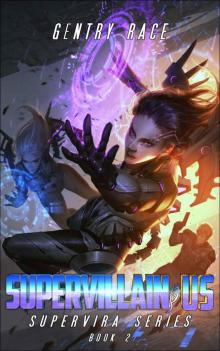 Supervillain, Us
Supervillain, Us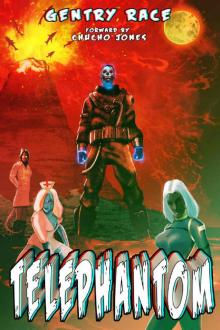 Telephantom
Telephantom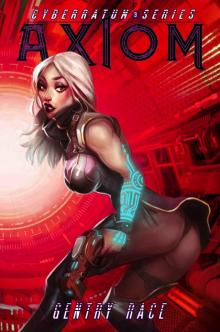 Axiom
Axiom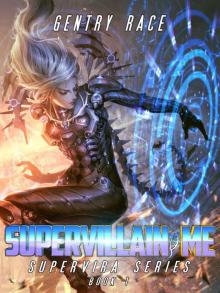 Supervillain, Me
Supervillain, Me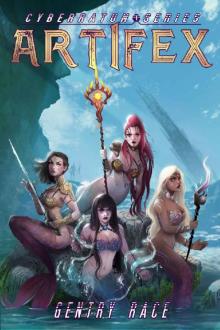 Artifex
Artifex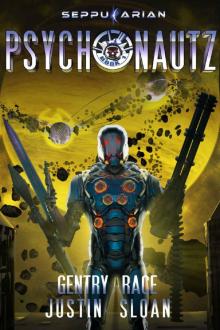 Psychonautz
Psychonautz